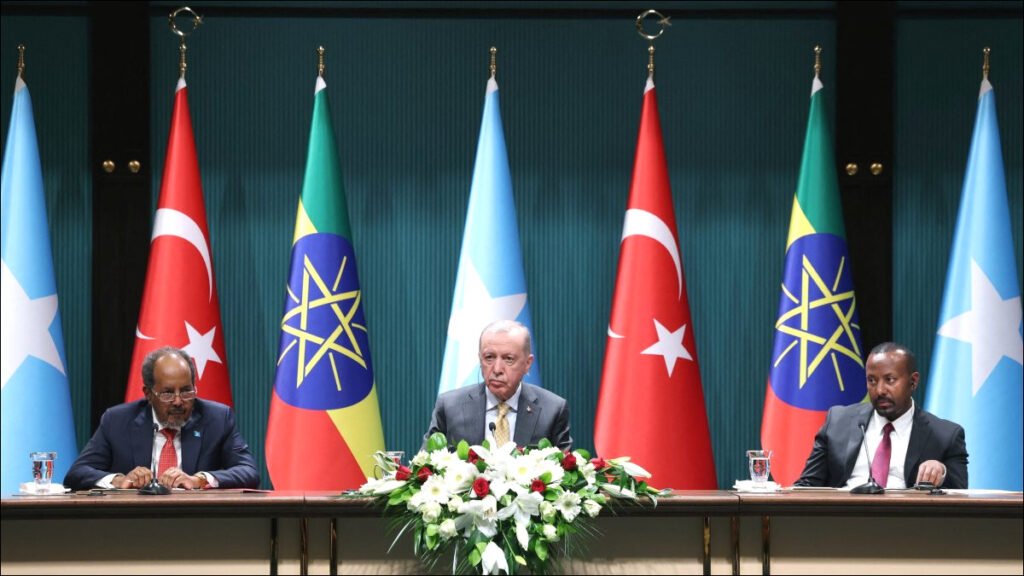In an era increasingly characterized by rising tensions and a cacophony of unresolved disputes, Türkiye emerges as a beacon of diplomacy, skillfully mediating between Somalia and Ethiopia. This mediation is not merely a triumph of localized negotiations; it stands as a testament to the nation’s broader commitment to fostering stability amid an unpredictable global landscape.
At the heart of the contention lies Ethiopia’s decision to lease Berbera Port situated in the self-declared “Somaliland.” Somalia perceived this maneuver as an affront to its sovereignty—a delicate matter steeped in layers of historical and political complexities. Somaliland, an unrecognized entity in northwestern Somalia, boasts its own governmental apparatus yet is universally deemed a part of Somalia by the international community. Absent the intervention of a neutral arbiter, the potential for this disagreement to spiral into a drawn-out conflict loomed large, threatening the fragile equilibrium of the Horn of Africa.
Türkiye’s strategic facilitation of dialogue culminated in the “Ankara Declaration,” embodying a diplomatic ethos rooted in mutual respect and constructive engagement. Key to this endeavor was Türkiye’s adeptness at leveraging shared regional and economic interests. For Ethiopia, access to Somaliland’s port is a lifeline for trade and socioeconomic stability, while for Somalia, Türkiye’s longstanding relationship has been reaffirmed through humanitarian support and infrastructural investments, ensuring that vital sovereignty concerns were acknowledged. By crafting a framework that harmonized these essential needs, Türkiye forged a pathway for compromise, thereby staving off a looming crisis.
A Mediator in Geopolitical Disputes
Türkiye’s peacekeeping initiatives in the Horn of Africa are emblematic of a broader, ongoing effort. Over the preceding decade, Türkiye has consistently stepped into the breach to mediate international disputes, often with marked success. Notably, its involvement in the Ukraine conflict has provided a crucial platform for discourse at a time of heightened global strife. Initiatives like the Black Sea Grain Initiative underscore Türkiye’s proactive stance, averting a potential food catastrophe by facilitating the flow of Ukrainian grain amidst the chaos.
At the helm of these diplomatic endeavors is President Recep Tayyip Erdoğan, whose administration has championed an assertive foreign policy aimed at positioning Türkiye as a proficient mediator on a global scale. Hakan Fidan, previously head of the National Intelligence Organisation and now serving as Minister of Foreign Affairs, plays a pivotal role in steering these strategies. His knowledge and leadership illuminate the multifaceted nature of Türkiye’s diplomatic accomplishments.
Türkiye’s engagement in the Syrian civil war serves as yet another illustration of its active participation in intricate international issues. From hosting peace negotiations to mitigating violence and providing refuge to millions, Türkiye has become a key player in enhancing regional stability while raising global awareness of dire humanitarian crises. Despite the challenges that remain, these efforts underscore a relentless pursuit of practical resolutions to protracted conflicts.
A Pragmatic Approach
The agreement between Somalia and Ethiopia not only exemplifies Türkiye’s talent for transforming discord into dialogue but also underscores the complexities woven into diplomatic initiatives. While Ethiopia’s dependence on Somaliland’s port presents a strategic necessity, Somalia’s anxieties regarding territorial integrity persist, unlikely to dissipate instantly. The enduring success of the Ankara Declaration hinges not only on Türkiye’s prudent navigation of these tensions but also on its sustained involvement.
As Türkiye’s global diplomatic footprint expands, it grapples with the intricate challenge of balancing influence with impartiality. Maintaining its credibility as a neutral mediator will prove critical yet increasingly challenging as it engages in multifarious disputes. Although Türkiye has made significant strides in cultivating trust, the nature of the disagreements it confronts will continually scrutinize its impartiality.
Türkiye’s diplomatic framework prioritizes dialogue and pragmatic solutions over hegemony. Its capacity to foster cooperation across diverse contexts—whether mediating the Somali-Ethiopian tensions or addressing broader crises like those in Ukraine and Syria—positions Türkiye as a pragmatic emerging actor in international relations. As Dr. Kaan Devecioğlu, Coordinator of North Africa Studies at ORSAM, articulated in an analysis for Anadolu Agency, “Türkiye’s neutral, constructive, and inclusive approach was pivotal to achieving this success.”
Through its earnest commitment to international diplomacy, Türkiye is crafting a legacy steeped in conflict resolution. While the challenges are considerable, its contributions to peacebuilding, particularly in volatile regions like the Horn of Africa, reinforce the notion that dialogue remains an indispensable tool for cultivating stability in a fractured world.

